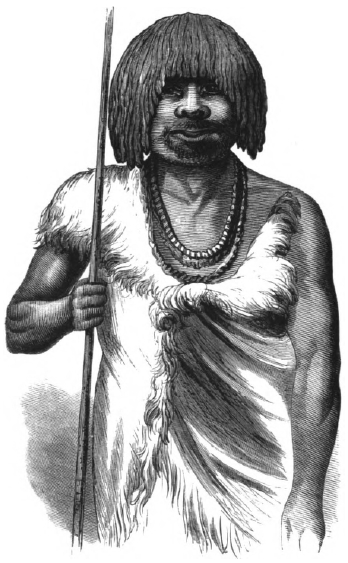Aboriginal Tasmanians
Aboriginal Tasmanians refer to the Indigenous peoples of the Australian state of Tasmania who are part of the broader group of Australian Aboriginals. Before the arrival of European settlers in the late 18th century, Tasmania was exclusively inhabited by the Aboriginal Tasmanians, a hunter-gatherer people with a complex culture and deep connection to the land. The impact of European colonization was devastating to the Aboriginal population due to introduced diseases, conflict, and displacement from their lands.
History[edit | edit source]
The history of Aboriginal Tasmanians is thought to date back at least 40,000 years, based on archaeological findings. They lived as semi-nomadic tribes, each with their distinct territory and language. The population before European contact is estimated to have been between 3,000 and 15,000 individuals.
The first recorded European contact was in 1642, when Dutch explorer Abel Tasman sighted the island. However, it was the establishment of a British penal colony in 1803 that marked the beginning of significant European impact on the Aboriginal people. This period, known as the Black War, was marked by violent conflict and resulted in the near-destruction of the Aboriginal population in Tasmania.
In 1830, the British government attempted to end the conflict through a policy known as the "Black Line," aiming to corral the remaining Aboriginal people onto the Tasman Peninsula. This effort largely failed, but the disruption to the Aboriginal way of life was catastrophic. By the mid-19th century, the Aboriginal population had been dramatically reduced, with many historians once believing the community to have been entirely "extinct" by the late 1800s. This narrative has been challenged and revised to recognize the survival and continued presence of Aboriginal Tasmanians.
Culture[edit | edit source]
The culture of Aboriginal Tasmanians is rich and varied, deeply connected to the environment of Tasmania. They developed sophisticated practices of hunting, fishing, and managing the land through controlled burnings, known as "fire-stick farming," to encourage the growth of plants and the presence of game animals. Their social structure was complex, with a deep spiritual connection to the land, which was reflected in their practices, stories, and ceremonies.
Contemporary Issues[edit | edit source]
Today, the Aboriginal Tasmanian community is vibrant and active, with a strong emphasis on reclaiming and preserving their heritage, culture, and language. Issues such as land rights, recognition of past injustices, and the impact of historical policies on current generations are central to the community's efforts. The Tasmanian government has taken steps towards reconciliation, including the return of land and the recognition of Aboriginal Tasmanians in the state's constitution.
Demographics[edit | edit source]
The modern Aboriginal Tasmanian community is diverse, with many individuals identifying as descendants of the original inhabitants of the island. The Australian census includes data on Indigenous identification, but the specific number of Aboriginal Tasmanians can vary based on self-identification criteria.
Conclusion[edit | edit source]
The story of the Aboriginal Tasmanians is one of resilience and survival in the face of adversity. Their history, from the earliest times through the challenges of European colonization to the present day, reflects a deep connection to the land of Tasmania and a strong cultural identity that continues to thrive.
Search WikiMD
Ad.Tired of being Overweight? Try W8MD's NYC physician weight loss.
Semaglutide (Ozempic / Wegovy and Tirzepatide (Mounjaro / Zepbound) available. Call 718 946 5500.
Advertise on WikiMD
|
WikiMD's Wellness Encyclopedia |
| Let Food Be Thy Medicine Medicine Thy Food - Hippocrates |
Translate this page: - East Asian
中文,
日本,
한국어,
South Asian
हिन्दी,
தமிழ்,
తెలుగు,
Urdu,
ಕನ್ನಡ,
Southeast Asian
Indonesian,
Vietnamese,
Thai,
မြန်မာဘာသာ,
বাংলা
European
español,
Deutsch,
français,
Greek,
português do Brasil,
polski,
română,
русский,
Nederlands,
norsk,
svenska,
suomi,
Italian
Middle Eastern & African
عربى,
Turkish,
Persian,
Hebrew,
Afrikaans,
isiZulu,
Kiswahili,
Other
Bulgarian,
Hungarian,
Czech,
Swedish,
മലയാളം,
मराठी,
ਪੰਜਾਬੀ,
ગુજરાતી,
Portuguese,
Ukrainian
Medical Disclaimer: WikiMD is not a substitute for professional medical advice. The information on WikiMD is provided as an information resource only, may be incorrect, outdated or misleading, and is not to be used or relied on for any diagnostic or treatment purposes. Please consult your health care provider before making any healthcare decisions or for guidance about a specific medical condition. WikiMD expressly disclaims responsibility, and shall have no liability, for any damages, loss, injury, or liability whatsoever suffered as a result of your reliance on the information contained in this site. By visiting this site you agree to the foregoing terms and conditions, which may from time to time be changed or supplemented by WikiMD. If you do not agree to the foregoing terms and conditions, you should not enter or use this site. See full disclaimer.
Credits:Most images are courtesy of Wikimedia commons, and templates, categories Wikipedia, licensed under CC BY SA or similar.
Contributors: Prab R. Tumpati, MD




